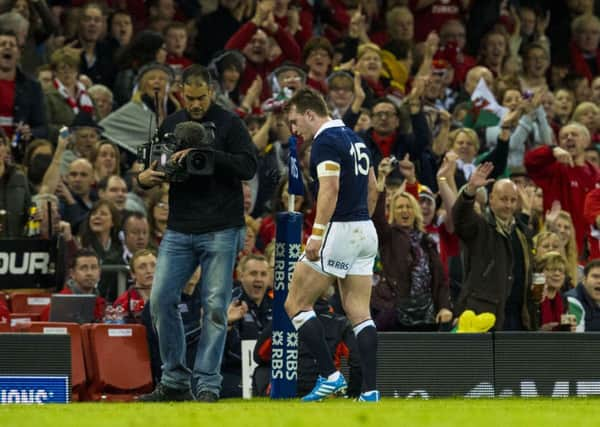Scott Johnson must share blame for 51-3 rout


But the game was still open. The Scottish pack were exerting pressure, and things didn’t look too bad. Then came Stuart Hogg’s dismissal.
What followed was mostly predictable, but one thing wasn’t. Scotland had Jack Cuthbert on the bench. He was, one assumed, there to cover full-back and wing. There was also Duncan Taylor, capable of doing that too. It seemed obvious to me that Scott Johnson would bring on either Cuthbert or Taylor and call off one of the flankers, for seven forwards are less at a disadvantage against eight than six backs are against seven. One has quite often seen seven battling forwards hold their own against eight. But the substitution wasn‘t made, and for the life of me, I can’t think why not. The result was that, exploiting the space left by the absence of a full-back, Wales ran in tries almost at will.
Advertisement
Hide AdAdvertisement
Hide AdHogg may be held by many to be responsible for the scale of defeat, but, to my mind, Johnson, by failing to respond intelligently to Hogg’s dismissal, must share that blame. It was as if he shrugged his shoulders and said “that’s it gone”. Consequently, he left his new cap, Dougie Fife, cruelly exposed. Coaches don’t lose matches, but their decisions can contribute to the scale of a defeat. If Johnson makes no better decisions in his role as director of rugby, he shouldn’t last long in that job.
Not everything about the match was depressing, even if you needed rose-tinted spectacles to come to that conclusion. There was some sterling play by the forwards. David Denton was again outstanding. Like Simon Taylor before him, he has one wondering just how tremendous he would be in a winning team. Our incoming coach, Vern Cotter, may find him as essential to Scotland as Julien Bonnaire has been to his Clermont-Auvergne side – and make as good use of him.
But, in truth, there isn’t too much to worry about up front – and perhaps Cotter will even allow Ryan Grant to play a full match. Scott Lawson is another who has done exceptionally well, playing with better judgement than he did in his fiery and ill-disciplined youth.
Jim Hamilton has shown there’s a good deal of life left in him. Richie Gray has done well, though he has not been the dominant figure he looked like being a couple of seasons ago. It will be interesting to see if he can hold off the challenge of his younger brother, Jonny, over the next 12 months.
We have a problem at half-back. Greig Laidlaw seems to have lost confidence, and therefore form. In the last three matches the introduction, probably too late, of Chris Cusiter has lifted the tempo. If we had another match next week, Cusiter would surely start. Duncan Weir has done a lot of good things without yet persuading one that he is more than a very good club player. |It’s a pity that we haven’t been able to introduce him to the international game as Ireland did Jonny Sexton, with him playing second fiddle to Ronan O’Gara, and as they now have Paddy Jackson in the same relation to Sexton himself.
If you look at the statistics – and set aside the score – you might think Saturday’s was a pretty even match, with Scotland indeed having more possession than Wales, and more of the territorial advantage, too. Which, of course, only goes to demonstrate the abiding truth of the old line that there are “lies, damned lies and statistics”, for the fact is that Wales looked capable of scoring whenever they had the ball in hand, and we almost never did. Admittedly our depleted defence made things easier for the Welsh, but this difference was evident even before Hogg was sent off. The Scottish back-line was willing. There was some neat footwork by Matt Scott and Max Evans. But it was all stop-start stuff and except when Denton once made a clean break through the middle we scarcely ever looked like creating a free-running try. The closest we came to crossing the Welsh line was from a series of pick-and-drives from short range. Scott Johnson has been unfortunate to have been deprived of our two most dangerous wings, Sean Maitland and Tim Visser. But, even though he was originally hired as an attack coach, our attack has been sadly lacking in bite. Time and again we have had to resort to the short inside pass, taking the recipient straight into a waiting tackler – simply because we weren’t going anywhere on the outside.
Before the match Warren Gatland implied that there was a considerable gulf between the top four teams in the championship and the bottom two. If we were inclined to resent this, he has, sadly, been shown to be right. Both Scotland and Italy conceded more than 50 points on Saturday. Neither, one might add, even has a reliable goal-kicker.